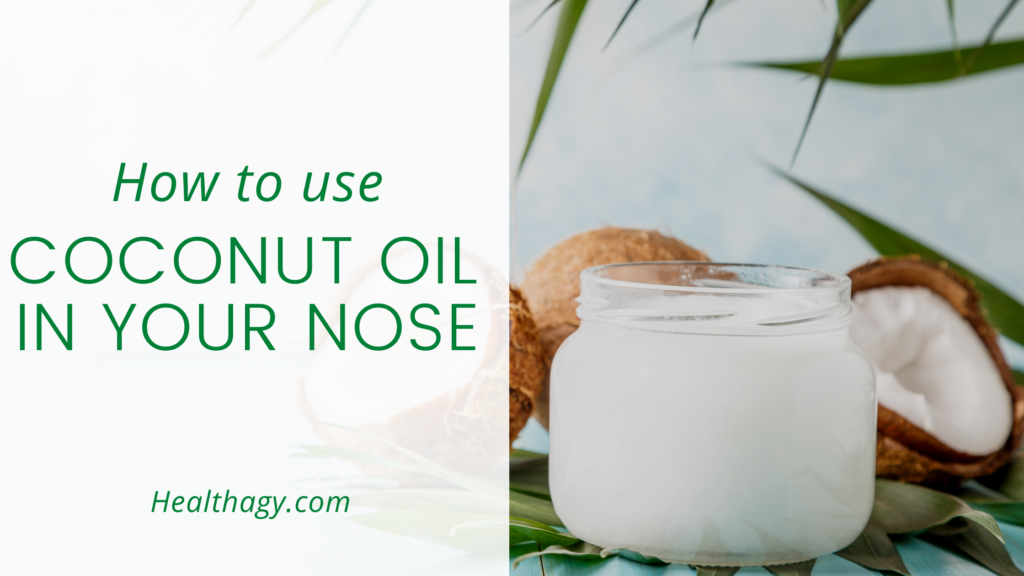
Has your dry nose gotten the best of you? Has dry air or nasal congestion took its toll on your nose? If you’ve found yourself with dry skin or with dry nasal passages, a little coconut oil may help you find the relief for that nasal dryness you’ve been dreaming of!
Benefits of Using Coconut Oil for your Skin and Nose
Coconut Oil is an oil that is extracted from the meat of coconut palm. Cultures worldwide have been using coconut oil for home remedies for centuries, as it can be used topically and ingested. Coconut oil is very versatile in that it can be used in cooking, soaps, cosmetics, and medicinal care.
The main benefit of coconut oil is that it contains both monolaurin and lauric acid. Making it jam-packed with antiviral properties, anti-inflammatory properties, anti-fungal properties, antibacterial properties, and nutrients. Along with its fatty acids, all this makes it great for lubricating and moisturizing skin, acting as a sealant, helping skin seal in and retains its natural moisture.
It is the perfect remedy for soothing dry nasal passageways and inflamed skin. The bonus may also help guard against harmful bacteria lurking around your nose while healing the area.
Using a small amount of coconut oil in your nose, you may be able to soothe and help heal a dry nose instantly.
Rubbing a dab of coconut oil in your nose helps to lubricate and bring moisture back into your nasal passageways. This will help protect and restore the nasal lining of your nose to its naturally moist state.
How to Put Coconut Oil in Nose:
- With clean hands, rub a dab, less than a teaspoon of coconut oil, together between the palm of your hands to liquefy it.
- Using a small finger, like your pinky, or using a Q-tip/ cotton swab, gently rub the dry areas right in and around your nose.
- You’ll want to repeat this a few times throughout the day and before bed until the area has healed.
Can Coconut Oil Help a Sinus Infection?
Oil pulling has grown in popularity over the years. Oil pulling is an ancient Ayurvedic medicine technique in which oil such as high-quality, organic coconut oil, sesame oil, or olive oil is swooshed around in the mouth to draw out bacteria toxins. It is said to aid in oral health, helping to ward off gum disease, inflammation and reduce plaque- and may help relieve sinus issues (and hangovers too).
Tips to Open Your Stuffy Nose to Breathe Better
Sinus congestion is never fun, but there are a number of natural remedies that may help give you relief while your body is healing.
- Hot Shower: The steam can help open up nasal passageways for easier breathing.
- Staying hydrated: Drinking plenty of water helps flush your body from toxins.
- Use a humidifier: Moisture in the air often helps heal a dry nose and dry nasal passageways.
- Essential oils: Diffusing essential oils such as peppermint oil or eucalyptus oil can help open up nasal airways and clear mucus.
- Neti pot: A neti pot is a specially designed pot, like a flattened teapot that is used to flush or rinse the sinuses and nasal passages with warm water.
- Air purifier: Air purifiers can be particularly helpful if you feel your nasal congestion is allergy-related.
- Healthy Diet: Eating a healthy diet that supports your immune system is always a great way to support your body in healing.
Up Next:
Shea Butter Vs Coconut Oil, Which is Best for Your Skin?
11 Health & Beauty Uses for Coconut Oil and Apple Cider Vinegar
Karla Kueber is a Certified Evidence Based EFT Practioner and Health Coach, with a double Masters Degree in Education. She works with people to overcome emotional eating, curb cravings, and overcome resistance to eating new healthy foods. You can learn more about coaching with her here.